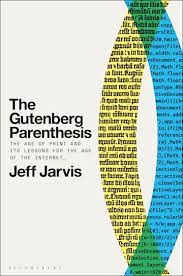The Gutenberg Parenthesis
The Age of Print and Its Lessons for the Age of the Internet
Jeff Jarvis
The age of print is a grand exception in history. For five centuries it fostered what some call print culture – a worldview shaped by the completeness, permanence, and authority of the printed word. As a technology, print at its birth was as disruptive as the digital migration of today. Now, as the internet ushers us past print culture, journalist Jeff Jarvis offers important lessons from the era we leave behind.
The Gutenberg Parenthesis traces the epoch of print from its fateful beginnings to our digital present – and draws out lessons for the age to come. It reveals how print gave rise to the idea of the mass – mass media, mass market, mass culture, mass politics, and so on – that came to dominate the public sphere.
Brimming with broad implications for today’s debates over communication, authorship, and ownership, Jarvis’ exploration of print on a grand scale is also a complex, compelling history of technology and power.
Published by Bloomsbury
Praise for The Gutenberg Parenthesis
Jeff Jarvis is the ideal guide for this fast-paced history of communication. Shrewd, witty and always generous to his fellow authors, this book is crammed with pointed observation and profound reflection on the present and future of information culture. As print transitions to the digital age, Jarvis explores the potentialities and dangers of unbridled access to information as a realist who sees a path to sanity as our media turbulence finds a new normal. ―Andrew Pettegree, Wardlaw Professor of History, University of St. Andrews, UK
Jeff Jarvis magisterially charts how the invention of printing shifted power from individuals and communities to experts and the undifferentiated ‘masses,’ and then brilliantly shows how the internet is reversing this half-millenium shift. Information in print became a controlled commodity with enforced scarcity that reinforced language and institutional borders and power. Initially extending the reach of thought, printing shaped that thought; the medium became the message, on steroids. Digital now makes possible and even insists upon richer, less controlled exchange of ideas, including fakes. What we need, Jarvis makes clear, is not censorship of our chaotic global conversation but clear goals, guardrails, and institutions to ensure inclusion, accuracy, and privacy. We are all facing this together, and are now all on notice to take up Jarvis’ challenge. ―Anthony Marx, President and CEO, New York Public Library
